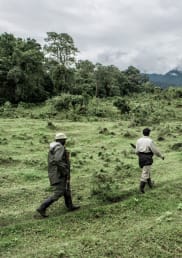Preventing wider conflict
International Alert Phlippines Statement, 14 May 2021

The Office of the Presidential Adviser on the Peace Process (OPAPP) released a statement on 9 May 2021 criticizing International Alert Philippines for declaring that the normalization process has failed to normalise conditions in the Bangsamoro.
OPAPP accused Alert and its Senior Peace and Conflict Adviser for not recognising the other key aspects of the process and for “war-mongering” by making sweeping statements about the flaws and failures of this integral component of the Comprehensive Agreement on the Bangsamoro (CAB) and the Bangsamoro Organic Law (BOL). OPAPP also questioned Alert’s proposal to pause, take stock, and reverse course, arguing that this will only erode trust and allow the resumption of violence.
These comments were in response to key issues that Alert underlined in an April 30 press release that asked (a) why ceasefire protocols and mechanisms are still being invoked by the Moro Islamic Liberation Front (MILF) against security forces in pursuit of violent extremists, or (b) why the Bangsamoro Transition Authority (BTA) and Bangsamoro Autonomous Region in Muslim Mindanao (BARMM) failed to enact a vital land law that is central to the normalization process, and (c) why kinship relations must not be allowed to get in the way of preventing and countering violent extremism.
These are valid questions that need to be answered. They emerge from conflict monitoring reports that reveal the intractable nature of land-related conflict, the proliferation of illicit weapons, the resurgence of extremist violence, and
the increase in identity-based conflicts, some of which involved MILF combatants themselves.
However, Alert believes that this is not the time to engage in a public debate. We acknowledge the many issues that OPAPP raised and are prepared to present the conflict evidence. We are glad to know and we welcome OPAPP’s openness to hear Alert’s proposals and recommendations to improve the normalization process.
We believe that this conversation must begin in earnest. The past two weeks have seen the extent of public anxiety and dismay over the rising violence. Our peacebuilding and development partners including those working in local governments have similarly called on the government and the MILF to demonstrate greater resolve in ending the extremist violence of the Bangsamoro Islamic Freedom Fighters (BIFF) and their attacks on indigenous groups.
President Duterte has likewise shown his frustration and has called the attention of the BARMM leadership and its supporters to act seriously and urgently in confronting the BIFF, or else face the risk of a wider and bloodier war apace the unleashing of a full military response.
These facts offer an ironclad mandate for urgent action to prevent a wider conflict.



